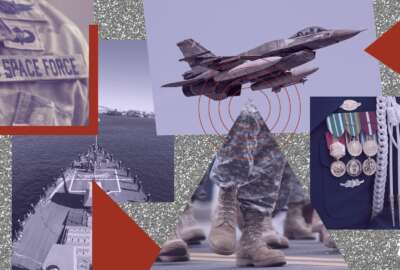Army finds new ways to ‘train the trainers’ in technical fields
The Army’s expanding technical specialties require leaders with the knowledge to train its young soldiers while keeping them up to date.
The Army is adapting the way it trains non-commissioned officers (NCOs) to meet the needs of its increasingly technology-dependent forces. As the service plans for its force of 2030, producing NCOs who can lead in cybersecurity and IT fields is informing the way training is developed and what specialties are available.
In addition to the talent needs of an expanding Cyber Corps, the Army’s Signal Corps finds itself short on information technology experts. The Army not only needs senior leaders to fill those roles, it needs to keep them up to date with continuous training.
“When the new technologies come out, we’re going to be slightly behind. But we’ve got to keep pushing forward with that. I think we’ve just got to continue to assess and identify what needs to change with the training,” Command Sgt. Maj. Linwood Barrett of the Army Signal School said at a Wednesday AFCEA TechNet conference in Augusta, Georgia.
Barrett said in the future the Army plans to offer NCOs professional military education (PME) specifically focused on data literacy, but that program is still in the future with a plan to be fully implemented by 2025.
In the meantime, NCOs have to train soldiers on how to use technology and how to maintain and fix the equipment they use. The issue becomes how to “train the trainer.”
“Do we have to be more technical? The answer to me is, yes, absolutely. We have to understand the space, we have to understand our devices, we have to be able to explain how it operates, where it works,” said Command Sgt. Maj. Jack Nichols of Army Cyber Command. “It goes back to getting the NCOs trained — getting them trained up at the schoolhouse at becoming more proficient in what we do and how we operate and how we perform in the environment.”
One of the challenges for NCOs is the variety of jobs they take on as they move through their career path. They may have a technical specialty, but after spending two years in a billet that doesn’t require the skills of their specialty, they are no longer up to date because the technology changed. For example, an NCO might be sent to a drill sergeant billet or a recruiting position and then rotate back to an IT job that evolved dramatically over two years.
“When they show up, and we’re like, ‘Hey, you’re now platoon sergeant,’ we just make sure we have that training, right? We’re taking a look at that: How do we keep them up to date? It’s a very fine line on trying to balance all this,” said Command Sgt. Maj. Jerry Dodson from the Army Maneuver Center of Excellence.
The Army offers both online credentialing programs, and hands-on training programs to develop its soldiers’ technical skills. The Army’s Credentialing Opportunities Online (COOL) website offers a portal to credential programs with guidance for what is needed in certain specialties and for promotions. The Army updated its career management fields over the past year to reflect changing needs.
One option the Army is considering is hiring adjunct instructors to help senior leaders keep pace with the information they need.
“We’re looking at experimenting with adjunct faculty models. Institutes tap into subject matter experts through adjunct faculty programs; why couldn’t we? If the subject matter experts are out there, and they have relevance, they can help us with the next generation,” said Command Sgt. Maj. Ronald Krause, the top enlisted leader for the Army’s Cyber and Electromagnetic Warfare School and Cyber Corps.
One program Cyber Corps offers allows trainers who work with software development to continuously update code even as they teach it.
“If you utilize some type of software development code repository, you’re able to see and work on the material all at the same time,” Krause said. “We offer this for operational subject matter experts to have access, control oversight and access to course curriculum so that they can offer updates for review and approval. We can make changes rather than waiting a year, two years, three years. We can start to adapt inside of the cycles.”
Copyright © 2025 Federal News Network. All rights reserved. This website is not intended for users located within the European Economic Area.
Alexandra Lohr, a former staff member, covered the Defense Department for Federal News Network until September 2023.





